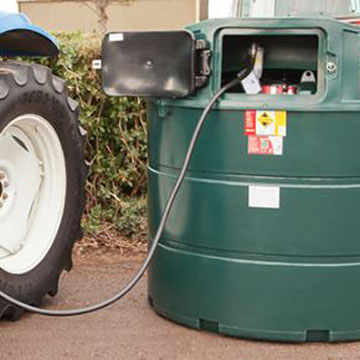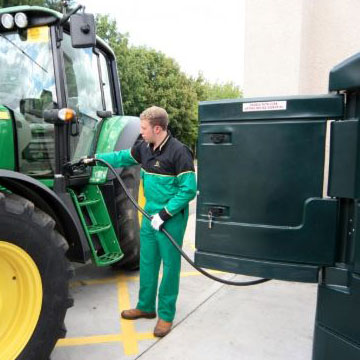With most agricultural farm businesses being located in rural areas, it is likely that they will have facilities on site for agricultural fuel storage. As the land owner you will be responsible for taking precautions to prevent spillages and contamination, therefore ensuring the fuel storage tanks on your farm are fit-for-use is an important on-going consideration.
How often should I check my Agricultural Fuel Tank for signs of damage?
Agricultural farm fuel can be safely stored in either a metal or plastic fuel storage tank, with FDA Fuel Depots becoming increasingly popular. We recommend carrying out an inspection of your agricultural fuel storage tanks and associated pipework every two weeks, as well as having the system inspected yearly by an OFTEC registered engineer. This is especially important for commercial farm storage tanks which often have a larger capacity than domestic heating oil tanks, to be able to cope with the demands of grain dryers and agricultural machinery.
With the average lifespan of a fuel storage tank being between 10-15 years (Some tanks may still have a working life after 15 years with careful maintenance), it is important to watch out for any signs of damage, particularly in older tanks although damage can occur regardless of the age of your tank.
How to inspect your agricultural fuel oil tank for damage or leaks:
An inspection of your fuel storage tank should include the base, surrounding area and any associated visible pipework. You should look for any changes to the tank and surrounding area since the last check was carried out, as well as anything which could indicate an oil leak is likely to happen or has happened.
Read more about carrying out an inspection of your Fuel Storage Tank here.
Check for corrosion on metal agricultural fuel storage tanks:
Traditionally steel storage tanks have been used to hold agricultural fuels due to their longer-working life, however in recent years many agricultural businesses have been switching to modern plastic bunded tanks. If you are using a metal tank to store fuel on your farm, it is important to ensure it complies with OFTEC standard OFS T200.
A metal storage tank will begin to corrode over time if not carefully maintained. Be vigilant of any signs of rust, flaked paint, cracks, bulges, scratches or areas of discolouration of the metal. It is important to remember that your metal tank can rust from the inside-out, and therefore visible damage to the exterior could indicate a larger problem with the tank. Once your metal tank has started to corrode on the exterior it won’t be long before cracks and holes appear which could let oil spill out causing contamination to the environment, which could be costly to clear-up.
Should you notice any signs of damage or cause for concern you should have your metal agricultural fuel storage tank assessed by an OFTEC engineer as soon as possible. Further oil deliveries should not be made into the tank until it has been assessed as safe to use.
Check for damage on Plastic Fuel Tanks and FDA Fuel Depots:
Although plastic fuel tanks are not affected by corrosion, they can be susceptible to other causes of damage. When carrying out an inspection on your plastic fuel tank or FDA we recommend being vigilant for whitening and decolouration, caused by exposure to UV light and sunrays. Freezing temperatures can also cause the plastic to become brittle leading to cracks and splits. An uneven base will cause your plastic tank to bow and stretch due to unusual pressures which could lead to cracks and splits.
Any signs of damage on your agricultural fuel tank should be checked by an OFTEC engineer to ensure it is safe for use. Should you notice any cracks or splits these can be plugged using a bar of soap as a temporary measure to reduce the chances of oil spilling out and to prevent water contamination to the fuel inside the tank.
Further advice on the signs of damage to look for on a plastic tank and what to do should a spill occur can be found here.
If you suspect that your agricultural oil tank currently has, or may previously have had a leak which has gone unnoticed, please contact our emergency line on 01343 543 535. The number is monitored out of hours and at the weekend too. We will then be able to provide further guidance on containing the spill and the next steps to take to minimise any environmental contamination.
For more information on tank inspections or replacement tanks, or for guidance on maintaining your fuel oil storage tank, contact our boiler maintenance department on 01343 557 435

